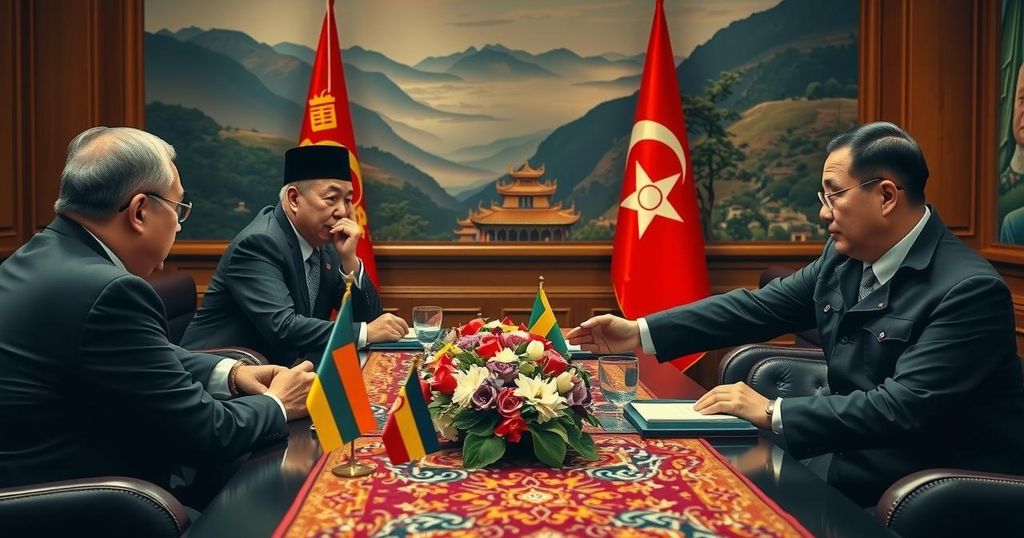Diplomatic Renaissance: Kassym-Jomart Tokayev’s Historical Visit to Mongolia

Kassym-Jomart Tokayev’s visit to Mongolia, the first by a Kazakh president in 16 years, signifies a strategic renaissance of diplomatic relations between the two nations. The visit aimed to enhance bilateral trade, which has seen a resurgence from $61 million to $150 million in recent years. Significant agreements were reached, including investment in satellite technology and nuclear energy cooperation.
Kassym-Jomart Tokayev’s recent visit to Mongolia marked a significant diplomatic milestone, as it was the first visit by a Kazakh president in 16 years. The relations between Kazakhstan and Mongolia had been stagnant under the previous administration, largely due to concerns regarding Mongolia’s political climate and civil unrest. Despite having a sizable Kazakh diaspora in Mongolia, which numbers over 117,000 and represents the largest ethnic minority in the country, strategic ties remained underdeveloped. Tokayev’s visit is a pivotal step towards revitalizing these relations, which aligns with his broader vision for a renaissance of Central Asia. During discussions with Mongolian President Ukhnaagiin Khurelsukh, both leaders underscored their commitment to enhancing bilateral relations, aiming to elevate their cooperation to that of a strategic partnership. This renewed relationship is further evidenced by historical trade dynamics; after years of decline, the trade volume between the two countries has seen a substantial increase from $61 million in 2021 to $150 million by the end of 2023. President Tokayev’s ambitious proposition to boost annual trade to over $500 million signals a strong commitment to economic collaboration. Significantly, during the visit, the two nations finalized an investment agreement for Kazakhstan to assist Mongolia in developing satellite technology. This collaboration includes the establishment of a satellite mapping program, which will represent Kazakhstan’s inaugural entry into space technology. In addition, a memorandum of cooperation was signed concerning nuclear energy development, showcasing Kazakhstan’s experience as a potential model for Mongolia. Experts, including Rustem Mustafin from Kazakhstan’s Institute for Philosophy, Political Science and Religious Studies, highlighted further opportunities arising from the visit, particularly concerning natural resource exploration. The two countries aim to jointly explore critical mineral deposits, which are increasingly essential in the global market, especially for high-tech manufacturing. The strategic partnership is poised to facilitate investment in mining and promote technological advancements, benefitting both nations economically and socially.
The backdrop to President Tokayev’s visit lies in the historically complex relationship between Kazakhstan and Mongolia, which spans over three decades of diplomatic ties but has faced periods of stagnation. Kazakh President Nursultan Nazarbayev refrained from visiting Mongolia during his tenure due to significant political unrest in Mongolia and concerns about stability in the region. In the years prior to Tokayev’s visit, trade relations had diminished significantly, culminating in a marked decrease due to the COVID-19 pandemic. This visit thus represents a renewed commitment to enhancing economic ties and deeper cooperation in various sectors, including technology and natural resources.
In summary, President Tokayev’s visit to Mongolia heralds a new chapter in Kazakh-Mongolian relations, aiming to forge a strategic partnership that enhances trade, technological collaboration, and resource exploration. The significant increase in trade volumes coupled with the signing of pivotal agreements signifies a proactive approach to not only economic ties but also deeper bilateral trust and cooperation in various sectors vital to both nations. This diplomatic renaissance illustrates both leaders’ vision for a future marked by stability and mutual growth.
Original Source: timesca.com







